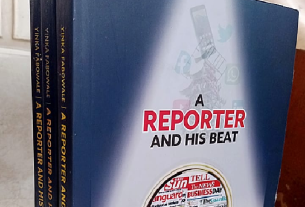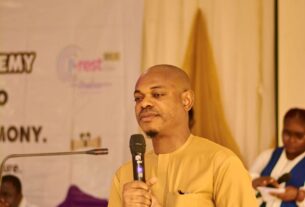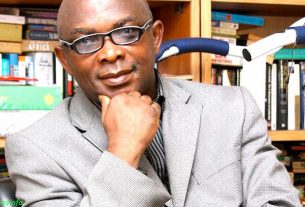The Nigerian Guild Editors have presented an eight-point plan to rescue the Nigerian media from its present state of distress to President Bola Tinubu and the 10th National Assembly.
Eze Anaba, the President of the Nigerian Guild of Editors , NGE, made the presentation on Wednesday at the opening of the guild’s 21st annual conference at the Presidential Villa Abuja.
The requests which he particularly charged President Tinubu to grant urgently to save the Nigerian media from an imminent collapse due to the crushing high operational costs are;
- Corporate tax reliefs for 5–10 years to help media houses stabilise and meet operating costs;
- VAT exemption on essential inputs such as newsprint, plates and broadcast equipment, “in line with practices in countries like Canada, India and South Africa”;
- Tax credits to incentivise large corporations to advertise in credible Nigerian outlets, boost investigative reporting and reducing reliance on foreign grants, low-interest loans through the Bank of Industry or the Development Bank of Nigeria to modernise equipment and create jobs;
- Media development fund for digital transition, managed by an independent board, to support data journalism and multimedia storytelling while insulating newsrooms from political interference;
- Legal reset to safeguard press freedom;
- Abrogation of laws that inhibit free expression, submission of the Guild’s review to the Minister of Information and House leadership;
- Creation of a Media Freedom and Safety Charter endorsed by the Executive, Legislature and Judiciary to protect journalists from arbitrary arrests and ensure access to information;
- Implementation of fiscal and legal measures to keep the country’s media houses vibrant and alive, as a weak media imperils Nigeria’s democracy and national cohesion.
In fact, Anaba declared: “The media today is distressed,” as he disclosed that a ton of newsprint now costs roughly N1.3m–N1.4m and lasts “just a day or two” in a typical press cycle.
His warned, “if the media cannot keep jobs by paying salaries, it cannot help our democracy.”
On the conference theme ‘Democratic Governance and National Cohesion: The Role of Editors’ and sub-theme ‘Electoral Integrity and Trust Deficit: What Nigerians Expect in 2027’, Anaba said editors must rise above division, reject hate speech, and centre underserved communities and conflict zones in daily coverage to rebalance “urban-centred” news agendas.
As reported by 21st Century Chronicle, Anaba said, “The pen must never be a tool for division, but for healing and bridge-building.”
He told his colleagues to shoulder a constitutional duty to inform citizens, deepen accountability and hold power to account “as constructive partners, not adversaries,” but can only do so if their organisations survive crushing production costs and legal threats.
“Our democracy is tested by insecurity, economic hardship, misinformation and declining public trust.
“When the press thrives, democracy breathes; when the press is stifled, democracy suffocates,” he told Tinubu and other delegates, citing Section 22 of the Constitution which mandates the media to uphold the objectives of the state and hold government accountable.”
He told editors and publishers to embrace technology without compromising ethics, recommit to fairness and patriotism, and generate “practical ideas that rebuild public trust and fortify our democracy” ahead of the 2027 polls.
“A free, responsible and vibrant press is the lifeblood of any democracy,” he said, adding, “When journalists are respected, protected and granted access to information, governance becomes more transparent and citizens better informed.”
He recalled that ANEC’s evolution started from a modest idea in 2004 into Nigeria’s largest annual gathering of editors, media leaders and partners, a forum he said has shaped national reflection for over two decades.
Anaba paid tribute to past NGE presidents who sustained the platform, just as he thanked the Presidency for recognising the media’s strategic role in nation-building.
The 21st ANEC brought together editors, past Guild leaders, senior media executives, traditional rulers and partners, with sessions dedicated to electoral integrity, countering misinformation and the economics of independent journalism.
Present at the event were the President, the Sultan of Sokoto, Sa’ad Abubakar III, the Governors of Imo Hope Uzodimma and Kogi, Usman Ododo as well as the Chief of Staff to the President Femi Gbajabiamila, Minister of Information and National Orientation, Mohammed Idris and other media leaders.
the Special Adviser to the President on Information and Strategy, Bayo Onanuga, the Special Adviser to the President on Media and Communications, Sunday Dare graced the opening ceremony.





